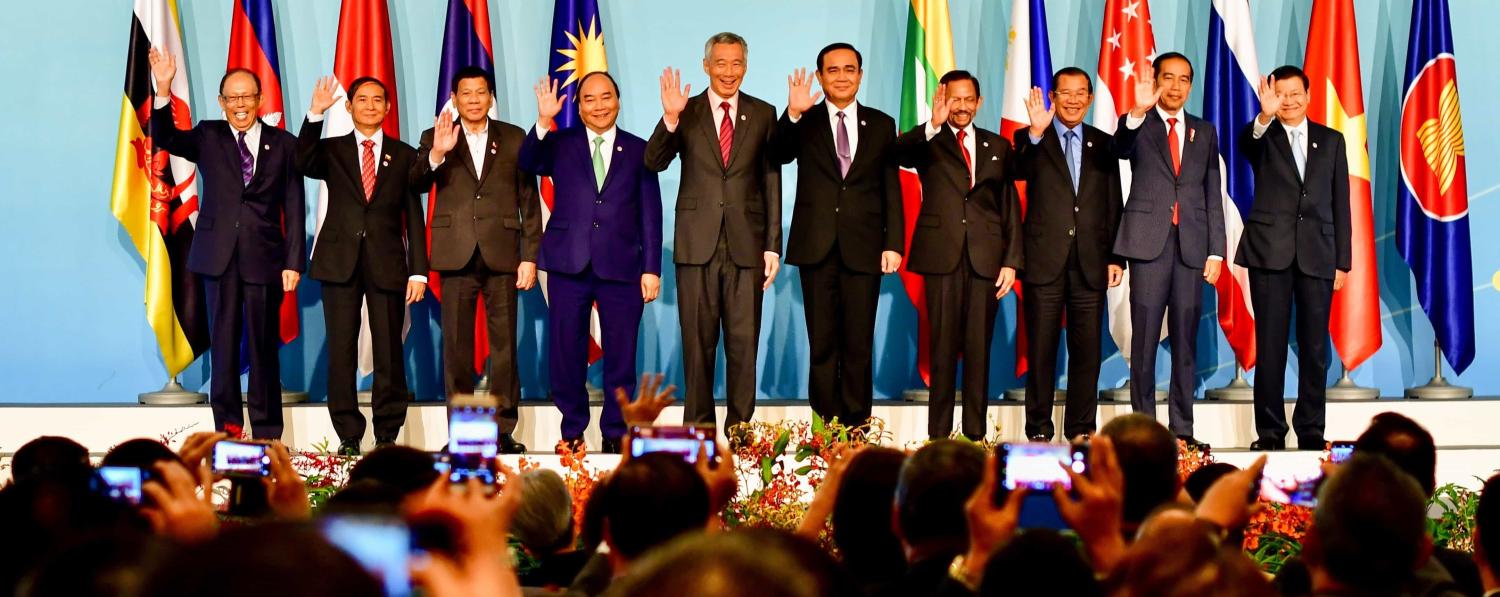With the US and China squaring up over trade, getting the 16-country Regional Comprehensive Economic Partnership (RCEP) signed by the end of the year seems increasingly important for the 10 member states of the Association of Southeast Asian Nations (ASEAN).
That urgency has been sharpened by US withdrawal from the Trans-Pacific Partnership (TPP), now an 11-country deal rebranded as the Comprehensive and Progressive Agreement for Trans-Pacific Partnership (CPTPP) after being signed in Chile in March.
Singapore’s prime minister clearly wanted to get a message across when hosting the ASEAN summit at the weekend.
“The fact is that we do not have a TPP,” Lee Hsien Loong told journalists after the meeting. “We have a Comprehensive and Progressive Agreement for Trans-Pacific Partnership, which has made it more urgent that we proceed with this [RCEP].”
Partly an ASEAN-led deal, the RCEP will include the ASEAN 10 as well as Australia, China, India, Japan, New Zealand, and South Korea. Of those, Australia, Brunei, Japan, Malaysia, New Zealand, Singapore, and Vietnam are on board with the diminished and still-to-be ratified TPP.
Given that it has a trade-to-GDP ratio of around 3:1, it was no surprise that Singapore, this year’s ASEAN chair, stressed the perceived urgency of underwriting smoother cross-border commerce. Trade is also important to other ASEAN economies: Malaysia, Thailand, and Vietnam all have trade volumes that rival or exceed their overall economic output.
US President Donald Trump’s screeching handbrake turn out of the TPP – a deal driven by his predecessor, Barack Obama – soon after taking office in 2017 has been followed this year by a series of protectionist moves that mostly target China.
Protectionism exists elsewhere, including in China, going by the Trump administration’s demand for “reciprocal” trade, and in Asian countries such as India and Indonesia.
But Trump’s apparent zeal for a trade war is facilitating Beijing’s touting of itself as the leader of anti-protectionism. China’s Xi Jinping was only too keen to don the Guardian of Globalisation cape at the last two World Economic Forum events in Switzerland, as well as at the Boao Forum held three weeks ago.
Analysts have noted the remarkable sight of illiberal and revisionist China presenting itself as a champion of the liberal, cooperative system. But China will, perhaps unsurprisingly, retaliate again should the US implement more protectionist measures.
Don Emmerson, Director of the Southeast Asia Program at Stanford University, said:
Those ASEAN members that rely more on trade and are more deeply embedded in value chains involving the US and China are especially likely to be worried.
One of the anticipated spin-offs of the ASEAN Economic Community established in 2015 is that ASEAN countries will trade more with each other. But for now, approximately 75% of ASEAN’s trade in goods is with non-members. In the much more integrated European Union, 64% of member-state trade in goods is among the 28 EU countries.
So getting those bigger external deals in place is crucial to trade-oriented Southeast Asia, bringing the focus back to the RCEP.
Closing the ASEAN summit, Lee made a point of singling out India, the second biggest country and third biggest economy involved in the RCEP negotiations, and hinted unsubtly that the talks need to speed up. Discussing the ASEAN-India summit hosted by India in January, Lee said:
All the ASEAN countries stated their position that this [RCEP] was something which was urgent, that we would like to have a substantive conclusion, and that time mattered and we very much hoped that we would be able to do it this year.
The warning to came as Prime Minister of India Narendra Modi was meeting China’s Xi in Wuhan, and as such was a timely reminder to New Delhi that stalling RCEP would see it fall even further behind Beijing in the race for trade and influence in Southeast Asia.
All the same, Lee said that ASEAN wanted, indeed expected, closer relations with China and India.
Lee said India was a very important participant and has significant reservations about liberalising goods and services without a corresponding liberalisation of the movement of peoples:
I think the January summit was productive in having everybody express their views ... I think they understood the message and they will consider their position.
The Singapore PM added that ASEAN wanted to trade more with what he termed “established economies ... particularly the United States”. That could be a message that the US should, in Singaporean eyes at least, revise its position on the TPP, which a U-turn that Trump has floated.
If Singapore ends up hosting the much-anticipated US–North Korea summit, Lee could then make his case in person to Trump.

